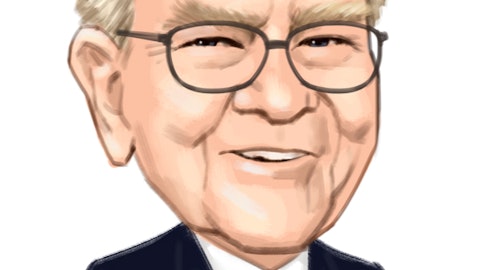And it’s a big part of our business from a billings perspective. And to remind people, our small business footprint is across a variety of small businesses, whether it’s restaurant and retail or professional services and construction and so forth. So we still feel good about it and I think that we’ll see just when organic does come back but we’re still very positive on small business.
Operator: Thank you. The next question is coming from Rick Shane of JPMorgan. Please go ahead.
Rick Shane: Thanks everybody for taking my question and congratulations, Kerri, we’ve really enjoyed working with you and Christophe. We are looking forward to more dialogue. I just have one question. There was a comment about raising the reserve rate modestly as we move forward. Obviously that’s not a function of changing economic outlook because you don’t know what that will be. I’m assuming it’s a mix shift issue. Can you talk about that a little bit in terms of what components are shifting in the mix and the different reserve rates for those products?
Christophe Le Caillec: Yeah, yeah. So the trend — there is like still a bit of normalization going on. So, if you look at our delinquency rates, they’re fairly flat. If you squint a little bit, you’re going to see a couple of basis points increase. And that’s effectively what I meant when I said that you should expect that reserve rate to increase a little bit. There’s still a little bit of normalization happening here, but as you know well, those delinquency rates and write-off rates are very strong relative to our historical performance and of course, relative to peers. So there’s nothing that gives me concern in that comment. It’s just to preempt a little bit what we are seeing.
Operator: Thank you. The next question is coming from Don Fandetti of Wells Fargo. Please go ahead.
Don Fandetti: Hi, good morning. Christophe, on the Basel III endgame, has the message — is the message still unchanged? I mean, it seems like that’s a pretty big increase in RWAs and that maybe you might have to ultimately dial back the buybacks at some point. Just want to get your thoughts on that.
Christophe Le Caillec: Yeah, so this is, as you know, a complicated set of rules, like over a thousand pages. So let me try to summarize it for you and the way we are thinking about Basel III. I think the right starting point is to remind ourselves that, first, we generate a lot of capital ROE in the 30% range. The second element of the starting point is that although our regulatory capital is at 7%, CET1 at 7%, we actually operate with a target of 10% to 11% percent. So that’s 300 to 400 basis point north of the regulatory level. And what I meant to say — my comment was to say that that buffer could be consumed by the Basel III rules if they are adopted as currently drafted. Another way of saying the same thing is that our level of capital today is very healthy given those rules.
I also need to highlight the fact that in the rules themselves, the regulators pause some questions about the applicability of these rules to businesses such as ours, and they reference the charge card, for instance, business. And as you know, over 75%, 78% of our revenue comes from fees, but those fees are stable, visible, such as card fees that we talked about a bit earlier. And we are actively engaged with the regulators to figure out what’s the right thing to do here. So we’ll see where we land. No one knows. But for now, I don’t expect any change to our near-term capital management policies and practices.
Operator: Thank you. The next question is coming from Jeff Adelson of Morgan Stanley. Please go ahead.
Jeff Adelson: Yes, hi. Thanks for taking my questions. Just wanted to focus a little bit on the spend versus account growth dynamics. It looks like your average spending per card or account is flattening out and your account growth is finally slowing a little — more flat sequentially this quarter, even as you continue to add 3 million new accounts or cards a quarter. And it came against the backdrop of your marketing a little bit lower this quarter, although it sounds like you’re going to be leaning back in next quarter to hit that $5.5 billion. So I guess my question is, are you seeing something that’s causing you to drive a little bit slower account growth here or is there anything going on with attrition or anything with Delta?
Steve Squeri: No. I think, it comes down to timing. And what happens is quarters happen to cut off on particular days, and that’s just the way it is. But no, we’re committed to the $5.5 billion overall approximately of marketing. You saw a slight sequential drop. I think we went under the 3 million for the first time in a while. And we look at account growth as, or cards acquired from an overall revenue perspective, but we still see tremendous opportunities out there, which is why we’ve sort of signaled here, more than signaled, we said we’re going to raise our marketing expense for next year as well. So, no, we’re not seeing anything at all. That gives us pause. And we will continue to acquire those cards as long as those opportunities are out there. So you will see a higher level of marketing spending in the next quarter.
Operator: Thank you. The next question is coming from Bill Carcache of Wolfe Research. Please go ahead.
Bill Carcache: Thank you. Good morning, Steve and Christophe. Welcome to the call.
Steve Squeri: Good morning.
Christophe Le Caillec: Good morning.
Bill Carcache: Can you share any initial thoughts on the open banking rule that the CFPB recently proposed? There’s a view that open banking essentially forces banks to hand over the keys to their customer relationships. I was just hoping you could speak to any opportunities that may present for Amex. And then following up on the capital commentary, Christophe, there’s a view that you could reduce your op risk if you treated your rewards expense as a contra revenue. Any thoughts on that would be great, thank you.
Steve Squeri: Yeah, look as far as [Fed now] (ph), I think let’s just go to the UK. UK’s had open banking for 10 years or so and it’s really had no impact on our business either positively or negatively. So I don’t really see this as a — as either a big threat or a big opportunity. And I think what I’d like to take you back, Bill, to is what product we’re actually offering. We’re offering a membership model product basically, which has lots of different components other than just commodity paying. And our product has so many more benefits from a security perspective, a fraud perspective, a dispute perspective than an open banking product would have. And so I really don’t see this, a, as either an opportunity or as a threat to our business, either in the short term or in the long term. I will turn the other question over to Christophe.





